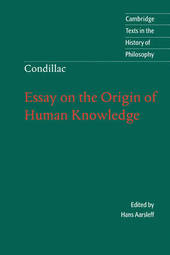
|
Condillac: Essay on the Origin of Human Knowledge
Paperback / softback
Main Details
| Title |
Condillac: Essay on the Origin of Human Knowledge
|
| Authors and Contributors |
By (author) Etienne Bonnot De Condillac
|
|
Edited and translated by Hans Aarsleff
|
| Series | Cambridge Texts in the History of Philosophy |
|---|
| Physical Properties |
| Format:Paperback / softback | | Pages:276 | | Dimensions(mm): Height 229,Width 152 |
|
| Category/Genre | Western philosophy - c 1600 to c 1900 |
|---|
| ISBN/Barcode |
9780521585767
|
| Classifications | Dewey:194 |
|---|
| Audience | | Tertiary Education (US: College) | | Professional & Vocational | |
|---|
| Illustrations |
Worked examples or Exercises
|
|
Publishing Details |
| Publisher |
Cambridge University Press
|
| Imprint |
Cambridge University Press
|
| Publication Date |
6 September 2001 |
| Publication Country |
United Kingdom
|
Description
Condillac's Essay on the Origin of Human Knowledge, first published in French in 1746 and offered here in a new translation, represented in its time a radical departure from the dominant conception of the mind as a reservoir of innately given ideas. Descartes had held that knowledge must rest on ideas; Condillac turned this upside down by arguing that speech and words are the origin of mental life and knowledge. He argued, further, that language has its origin in human interaction and in our natural capacity to react spontaneously and instinctively to the expression of emotions and states of mind in others. The importance of this pointedly anti-Cartesian view, and its relevance to both aesthetics and epistemology, were quickly understood, and Condillac's work influenced many later philosophers including Herder, Rousseau, and Adam Smith. His conception also anticipated Wittgenstein's view of language, its usage, and its relation to mind and thought.
Author Biography
Hans Aarsleff is Professor of English, Emeritus, Princeton University.
|